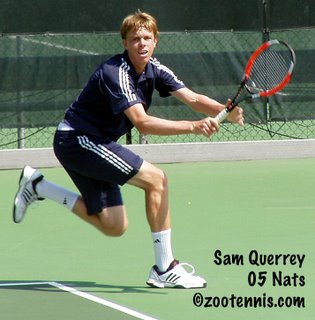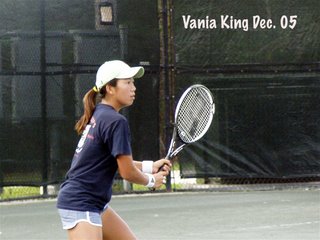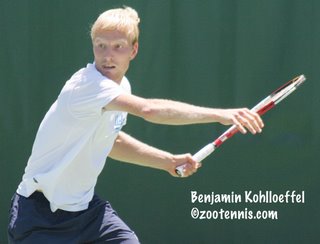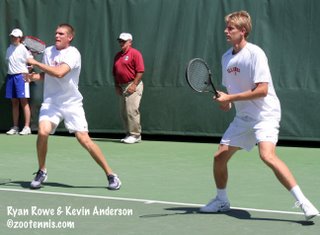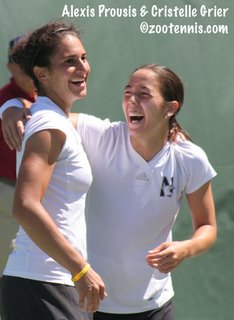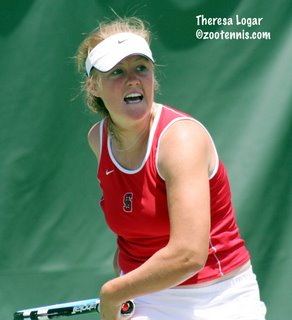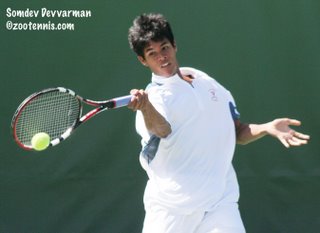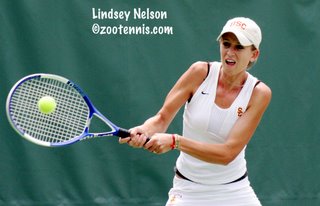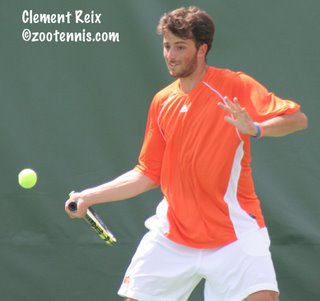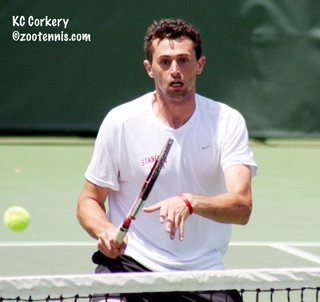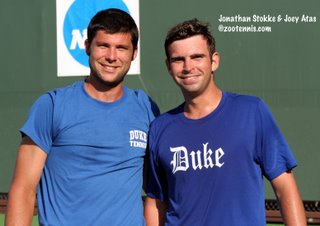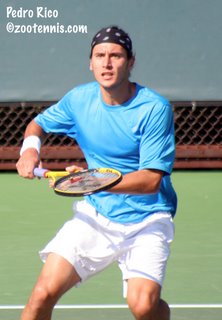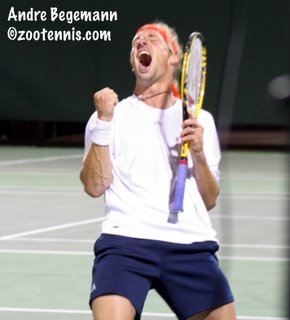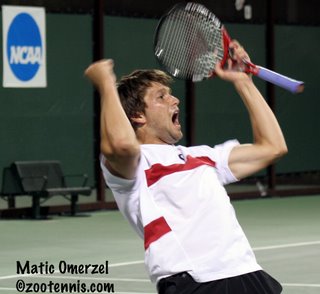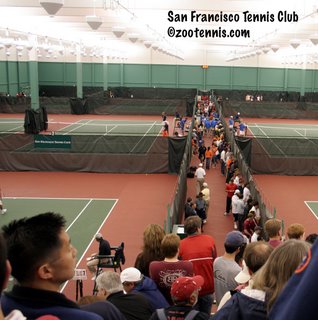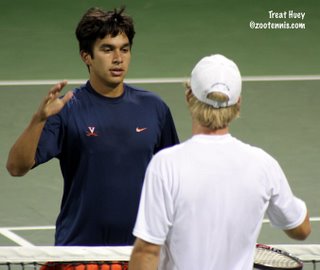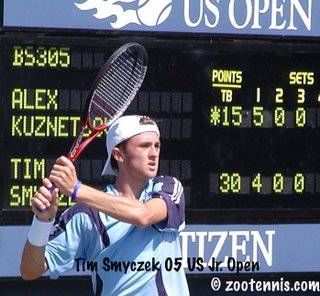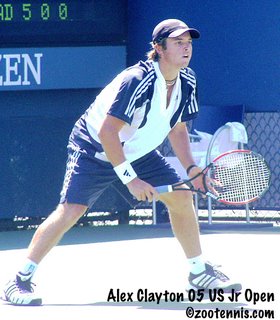
©Colette Lewis 2006
Palo Alto CA--
Cal’s Susie Babos had a ticket booked to return to her native Hungary on Sunday, but she’s changed it. She has a more pressing engagement for Monday-a chance to compete for the NCAA women’s title.
On a warm and cloudless afternoon, the unseeded Babos fought through a tense and controversial contest against crowd favorite and fellow lefthander Theresa Logar of Stanford, earning a 6-4, 3-6, 6-2 victory.
In a match featuring break after break, it was difficult to determine who had an advantage, but when Logar had a rare hold of serve to go up 4-3 in the second set and Babos needed one of her own to level, everything seemed to go awry for her.
At 30-30, Babos hit a serve that the linesman and umpire called good, but Logar and Stanford assistant coach Frankie Brennan didn’t see it that way. After Brennan, who was seated on the court, spoke heatedly to the chair umpire, Brennan re-took his seat but the Stanford crowd weighed in with an array of boos and catcalls. Shortly thereafter, the chair umpire called an unsportsmanlike conduct point penalty on Brennan, a point that gave Babos the game. The chair called the game score as 4-4, but Lele Forood, Stanford’s head coach, asked to speak to Jane Goodman, the women's tournament referee, who conferred with the chair umpire and reversed the point, on the grounds that college rules require a warning first. Logar won the next three points to take the game and held her serve to take the set, and clearly had the momentum as the third set began.
But Babos, a sophomore, regrouped.
“By taking my time, going to the bathroom, calming myself down a little bit, definitely helped” she said. “I changed my strategy, played with more variety, mixed up my down-the-lines and cross-courts, my serve as well, and that helped.”
As for the crowd, which was primarily but not exclusively pro-Stanford, Babos made adjustments there too.
“It’s hard to face the crowd when they are not cheering for you, and it really bothered me. At first it upset me, but then in the third set it just completely fired me up more.”
And perhaps the Stanford crowd, had they known, would have kept quiet, as Babos ran off four straight games to start the third set, although Logar, a nine seed, managed to give them a glimmer of hope at 4-2. But when Babos held for 5-2 it looked bleak and in Logar’s next game, the tension came out where in often does for Logar, in her serve. It was a double fault on match point that gave Babos the win.
The energetic fist-pumping that was prevalent throughout the match gave way to a less than enthusiastic net handshake, and Logar, a junior, was still angry a few minutes later in the postmatch press conference.
“She was making comments about everything,” said Logar, “and maybe that keyed her up going into the third. She just got hot in the third, and it was hard to come back from that.”
Babos meets another Pac-10 rival Tuesday in Lindsey Nelson, and for the first time ever, both of the women's finalists are unseeded.
Nelson, from USC, took out William & Mary’s Megan Moulton-Levy 6-3, 6-2, using her profoundly deep groundstrokes to keep the speedy Moulton-Levy back on her heels.

“She did not miss a ball,” said Moulton-Levy who is probably an inch or two short of the five foot height that she claims in the Tribe media guide. “She was painting the lines, she played incredibly. She didn’t give me the opportunity to get my game going.”
Nelson, who is at least a foot taller than Moulton-Levy, didn’t think it was quite that easy.
“It was so tough. She hits such a rough ball and I knew I had to work hard from the very beginning because she gets everything back. She gives you nothing to work with.”
Nelson has shown an ability to adjust to her opponent’s strength this week, and she has gained confidence from her wins over “all these great players.”
“It’s making good decisions, playing smart, staying positive and really believing in myself,” Nelson said. “I know I have the potential to be an amazing player, one of the best in the world and I just have to believe that.”
Given the upsets that were rampant all week, it's surprising that the men’s final will actually feature two seeded players—-Ben Kohlloeffel of UCLA, the top seed, and Somdev Devvarman of Virigina, a nine seed.
Kohlloeffel made short work of unseeded Erling Tveit of Ole Miss 6-3, 6-1, in another duel of lefthanders. Tviet struggled to hold his serve throughout the match which left him defenseless against the uber-quick sophomore from Germany.
“I didn’t get any free points off my serve like I usually do” said Tveit, a sophomore from Norway, "and he played really well.”

Kohlloeffel, who wasn’t broken in the match, had a different take on his own performance.
“Actually it was a bad match," he said. “We both didn’t play our best tennis. I guess I was the better of the worse today. I’m glad to win not playing my best tennis. But I hope I can play my best tomorrow.”
He’ll go into the final match on Tuesday as a heavy favorite, but he won't be dealing with a hostile crowd, as KC Corkery, the Stanford hope, ran out of gas against a fresher Somdev Devvarman, dropping their semifinal match 6-4, 5-7, 6-3.
Corkery got down immediately, and the crowd, already deflated by the Logar loss, was subdued. Devvarman, a sophomore from India, showed no sign of nerves, neutralizing Corkery’s attempts to win points at the net with returns that zeroed in on the Stanford senior’s shoetops.
Devvarman was up two breaks in the first set, which was fortunate for him, because Corkery found his game down 5-1 and brought the score back to 5-4.
“I think I did a pretty good job of trying to stay in there,” said Corkery, who is unsure of his plans after graduation next month. “The crowd really helped me out, they kept me in it.”
He needed them again in the second set, when he fell behind 4-2. But he raised his game, at one stage even indulging in a Jimmy Connors like fist pump, the crowd roaring its approval when he evened the set. He rode that wave of momentum to finish off the second set by breaking Devvarman.
But in the third set Corkery admitted to fatigue, and the vigilant Devvarman noticed.

“I saw him getting a little bit tired. He’s played a few longer matches than I have and I think it might have caught up to him. I definitely thought like I was stronger today.”
Once again Corkery got down early, and couldn’t quite pull even. When Devvarman got through the 4-3 game to take a 5-3 lead, Corkery had all the pressure weighing on him, and even though he took a 30-0 lead, things unraveled quickly.
“I hit one or two key shots, he missed a couple of easy volleys,” Devvarman recalled, “and the next thing you know I’m at match point, I play a good point and it’s over.”
The crowd gave Corkery a standing ovation after the match, but it wasn’t the ending either of them wanted.
“It was a great week,” said Corkery, who won a national championship in doubles with Sam Warburg in 2004. “I came up a little short, but I’m not disappointed. I had a great career here.”
There was more disappointment in store for Cardinal supporters as the top seeded doubles team of Alice Barnes and Anne Yelsey dropped a 6-3, 6-2 decision to unseeded Cristelle Grier and Alexis Prousis of Northwestern. The exit of Barnes and Yelsey left Stanford without a women's singles or doubles finalist for the first time since 1996.
Grier and Prousis will face Lucia Sainz and Katharina Winterhalter, a five seeded team, from Fresno State, who pulled a mild upset by ousting fourth seeds Sara Anundsen and Jenna Long of North Carolina 7-5, 6-3.
The men's doubles final will feature the second seeds, Andre Begemann and Scott Doerner of Pepperdine against the third seeded team of Kevin Anderson and Ryan Rowe of Illinois. Begemann and Doerner defeated the Middle Tennessee State team of Marco Born and Andreas Siljestrom, a five seed, 6-3, 7-6 (7). Anderson and Rowe came from a break down in the second set, winning the last four games to beat the unseeded Texas Christian duo of Rafael Abreu and Jordan Freitas 6-4, 7-5.

"We were always in every receiving game," said Anderson. "We just had to increase our intensity to get it done."
"We had really tough first and second round matches," said Rowe, of their victories over Corkery and James Pade, when they saved two match points, and again when they came back from a break down in the third to defeat Strahinja Bobusic and Colin Purcell of Georgia. "But I wouldn't say it was destiny. We still have to play well to win."
For more stories on the NCAA championships, see Stanford's website.
Tomorrow's finals will also be broadcast over the internet at radiotennis.com at noon Pacific Time.
